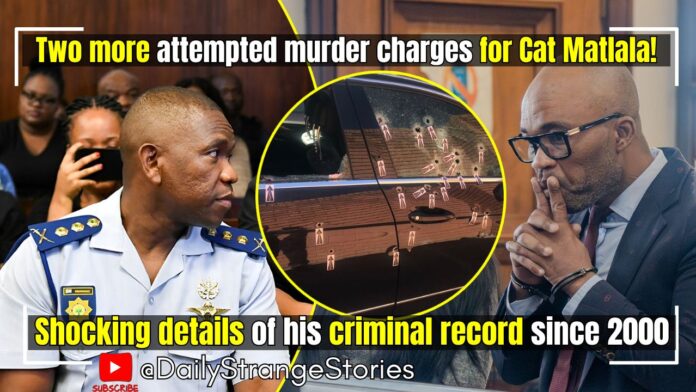In the heart of South Africa, a shadowy world of crime, politics, and power collided in a way that would grip the nation’s attention like never before. The story begins with General Nhlanhla Mkhwanazi, a determined law enforcement leader, fighting to keep his political killings task team alive against mounting political pressure. At the center of his investigations sits a figure whose name is whispered across police corridors and government offices: Vusimuzi “Cat” Matlala, a man whose past has remained hidden from the public eye for decades, until now.
By 6 July 2025, General Mkhwanazi’s task team was deep into high-profile criminal investigations. These were not just any cases. They involved suspected assassinations, attempted murders of high-profile figures like DJ Vettys and Joe Ferrari, and a sprawling web of corruption and influence that stretched from the streets of Gauteng to the highest echelons of government. It was this same task team, led by Mkhwanazi, that had arrested Cat Matlala in connection with a failed plot to kill actress and influencer Tebogo Thobejane, his former lover. But as the investigation into Matlala’s activities deepened, new details began to emerge, linking him to even more sinister plots and a long list of unsolved crimes.
Cat Matlala’s story is not one of a quick rise and fall. Instead, it is the tale of a man who, over more than two decades, built a reputation as a tenderpreneur, underworld operator, and suspected kingpin. His name first came to national attention when it was revealed that he had been arrested by the political killings task team in a dramatic operation. The team, acting on a warrant, stopped Matlala’s luxury Mercedes-Benz Maybach in full daylight, surrounding him and his protectors at gunpoint. There was no resistance. Matlala, used to the spotlight and the shadows, seemed almost unfazed as he was handcuffed and taken away.
But this arrest was just the latest in a long list of encounters with the law. The records show that Matlala has faced at least 13 police investigations over the years, ranging from housebreakings and thefts to attempted murders and suspected cash-in-transit heists. In nearly every instance, the cases were either mysteriously withdrawn, the charges dropped under controversial circumstances, or he was controversially acquitted. Only once was he convicted, for a house burglary in Pretoria in 2001. It was a record that raised eyebrows among law enforcement, especially when Matlala continued to win huge government contracts and rub shoulders with the country’s political elite.
The death of Babita Deokaran marked a turning point in South Africa’s battle against corruption. Her murder, linked to her resistance to fraudulent payments involving Cat Matlala’s companies, set off a chain reaction. The Special Investigating Unit launched a probe into R3 billion worth of contracts, including those awarded to Matlala. But even as investigations intensified, Matlala’s star seemed to rise. The SAPS itself would later grant him a massive police health services tender, raising questions about how a man with such a checkered history could continue to receive state contracts.
In December 2024, the story took a new turn. Police, investigating a kidnapping case, raided Matlala’s luxury home and his office. During the raid, they confiscated a range of items: business firearms, mobile phones, and expensive jewellery. Most of these items were returned to Matlala by the end of the month, but two luxury wristwatches were never booked into the official SAPS13 exhibit register. The watches simply vanished, and when Matlala’s lawyers demanded answers, the police claimed ignorance. The missing watches became a symbol of the wider issues of transparency and accountability in the case.
The legal battles escalated in July 2025, as Matlala’s lawyers pressed the National Prosecuting Authority and the police for full disclosure on the seized items and forensic analysis. They also demanded access to search warrants and supporting affidavits, complaining that the state was proceeding carelessly, using undisclosed WhatsApp messages and voice notes to build its case, while failing to share crucial information with the defense. The lawyers insisted that media reports about additional charges being added to Matlala’s rap sheet had already compromised his right to a fair trial.
Behind the scenes, the political killings task team faced its own existential threat. In late 2024, Police Minister Senzo Mchunu and Deputy Police Commissioner Shadrack Sibiya moved to disband the team, transferring over 120 investigation dockets to head office in Pretoria. The decision sparked outrage from General Mkhwanazi, who saw it as a direct attempt to shield figures like Cat Matlala and Katiso Molefe, another alleged underworld figure and suspected drug lord, from prosecution. Mkhwanazi refused to comply, vowing that his team would continue their work despite political interference.
As the investigation into Matlala’s activities widened, police linked him not only to the attempted murder of Tebogo Thobejane but also to botched attacks on other prominent figures. These included taxi boss Joe Sibanyoni, known as Joe Ferrari, who survived a hail of gunfire in Centurion in August 2022, and Seunkie Mokubung, also known as DJ Vettys, who was wounded in a targeted ambush in Pretoria West in January 2023. In both cases, the attackers used rifles and showed a level of planning that suggested coordinated attempts to eliminate their targets. The dockets from these attempted murders, originally registered in Lyttelton and Pretoria West police stations, were now being joined to Matlala’s growing list of criminal cases.
The police investigation relied on a combination of forensic evidence, including ballistic tests that linked weapons seized from arrested hitmen to the shootings. Among the suspects were alleged triggermen Musa Kekana, Tlego Floyd Mabusela, and Michael Pule Tau, who, surprisingly, was a South African Police Service detective, while also serving as the head of the underworld hit squad, it is alleged. The task team believed that these men were not acting alone, but were part of a broader criminal network financed by Matlala and others. Money trails, traced through bank accounts and phone records, suggested that Matlala had paid both the hitmen and their handlers, drawing on his considerable fortune amassed from government tenders.
What made Matlala’s case so unusual was not just the number of cases against him, but the company he kept. In 2016, he was arrested alongside convicted murderer Kagiso Ledwaba, who had escaped from court while facing a life sentence for killing German businessman Uwe Gemballa, a crime that had sent shockwaves through the luxury car industry. On another occasion, Matlala was found in the company of Radovan Krejcir’s feared hitmen, after police discovered a car stuffed with illegal rifles, police vests, hand radios, jamming devices, and more. The charges from that incident were later mysteriously withdrawn, as they were in most cases involving Matlala.
Here is a full list of Cat Matlala's criminal offences and their court outcomes.
1. In 2025 in Midrand: Attempted murder, conspiracy to commit murder, and money laundering – The Case is still pending.
2. In 2018 in Olievenhoutbosh: Attempted murder – Case withdrawn.
3. In 2016 in Sanddon: Possession of firearm without a license, impersonation of a police officer, resisting arrest, obstructing or assaulting a police officer – case withdrawn.
4. In 2015 in Silverton: Carjacking, possession of suspected stolen goods – case withdrawn.
5. In 2013 in Alberton: House robbery – case withdrawn.
6. In 2011 in Sunnyside: Theft of motor vehicle – withdrawn.
7. In 2006 in Lyttelton: Burglary at residential premises – case withdrawn.
8. In 2006 in Vaalwater: Cash-in-transit heist – not guilty or acquitted.
9. In 2001 in Sinoville: Burglary at residential premises – guilty.
10. In 2000 in Brooklyn: Theft of motor vehicle – case withdrawn.
11. In 2000 in Silverton: Theft of motor vehicle – case withdrawn.
12. In 2000 in Villeria: Possession of suspected stolen property: Case Withdrawn.
Matlala’s nickname, “Cat”, has its own legend. Some say he earned it by surviving a shooting during a cash-in-transit heist in the mid-2000s. Others believe it comes from Mamelodi street slang, where a cash-in-transit heist is called “katse”, the Setswana word for cat. Whatever the origin, it fit a man who seemed to have nine lives, surviving brushes with the law and the criminal underworld.
His criminal record is as long as it is varied: attempted murder, conspiracy, money laundering, carjacking, housebreaking, theft – the list goes back to 2000. Despite being found guilty only once, his name kept appearing in police files, linking him to crimes across Pretoria, Johannesburg, and beyond. Each time, he seemed to slip through the cracks, emerging wealthier and more connected than before.
The wealth Matlala accumulated was not hidden. He lived in a palatial home in the exclusive Midstream Ridge estate on the outskirts of Pretoria, drove high-end cars, wore luxury clothing, and enjoyed cosmetic surgery. His family moved through the world of supercars, exclusive mansions, and the kind of opulence that comes from controlling millions in state contracts. Yet, behind the façade, police investigations painted a picture of a man woven deeply into the fabric of South Africa’s criminal and political worlds.
The bigger picture was one of systemic corruption, where tenders were awarded not on merit, but through connections and kickbacks. The arms deal scandal of the early 2000s had already shown how deeply corruption could infect government. The murder of Babita Deokaran is a grim reminder that those who tried to stop the looting could pay with their lives. The case of Cat Matlala is a lightning rod for all these issues: a man with a dark past, protected by powerful allies, using ill-gotten wealth to capture state institutions and evade justice.
Now in August 2025, the story of Cat Matlala, the political killings task team, and the fight for justice is far from over. Matlala is due to return to the Alexandra Magistrate’s Court on 26 August, facing a raft of new charges. General Mkhwanazi’s task team, though battered by political interference, continues its work. The commission of inquiry, set up by President Ramaphosa, is just beginning to uncover the full extent of corruption, political interference, and criminality in the criminal justice system.
This is a story that reveals how the threads of crime, politics, and power are tightly interwoven in South Africa. It is a story of those who risk everything to expose the truth, and those who will stop at nothing to protect their secrets. As the details continue to emerge, one question remains: Do you believe justice will finally prevail in the case of Cat Matlala, or will connections and wealth continue to shield those at the top from accountability? Share your thoughts and let your voice be heard in the comments section below.

Follow Us on Twitter











